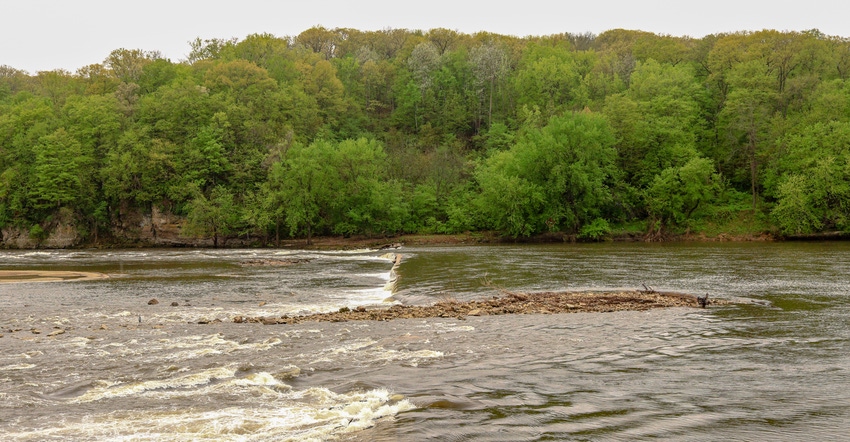June 10, 2021

Iowa Secretary of Agriculture Mike Naig joined the City of Cedar Rapids and Iowa Agriculture Water Alliance (IAWA) at the Clean Water in Iowa Starts Here tour stop in Buckingham, Iowa, in May. The group gathered to kick off the Cedar River Source Water Partnership project, a $19.3 million conservation project that will improve water quality, protect drinking water and help manage flood flows in the Cedar River.
"This project is a great example of what we can accomplish when rural and urban partners work together to achieve our shared soil health and water quality goals," Naig said. "This is one of four regional partnership projects that was recently awarded federal funding from the USDA Natural Resources Conservation Service, and that allows us to scale up our ongoing water quality projects exponentially. Iowa's conservation efforts have been successful because we have a science-based strategy guiding our conservation efforts, we've prioritized watersheds where we can make the greatest impact, and we have the technical resources and landowner interest to get the practices on the ground."
The Cedar River Source Water Partnership will link cities in the Cedar River watershed that have vulnerable drinking water supplies to their agricultural neighbors. The project's overarching goal is to improve water quality and protect source water in the Cedar River watershed. Other expected project benefits include reduced flood flows to downstream communities, and improved fish and wildlife habitat. Financial support will directly assist producers as they implement practices including cover crops, wetlands, bioreactors and saturated buffers. These farmland conservation practices are proven to significantly reduce nitrate runoff from farm fields. In addition to benefiting the Cedar Rapids drinking water supply, these practices will also help the state advance the goals outlined in the Iowa Nutrient Reduction Strategy.
"Cedar Rapids has been recognized nationally for our work to improve water quality through partnerships with upstream entities," said Roy Hesemann, utilities director for the city of Cedar Rapids. "The Cedar River Source Water Partnership will scale up our efforts to improve water quality in the Cedar River."
"This a great opportunity to build on several years of work in one of our priority watersheds to improve water quality and expand urban-rural partnerships in the Cedar River Watershed," says Sean McMahon, IAWA executive director.
Keys to success for this new Regional Conservation Partnership Program include supporting the ag retail engagement, communications and nonoperator landowner outreach components of the project. "IAWA looks forward to supporting these aspects of the project and is especially pleased to help provide funding for a new conservation agronomist position that will be employed by the Iowa Soybean Association and embedded within Linn Co-op," McMahon adds.
The city of Cedar Rapids Utilities Department is leading the project. Contributing partners include the Iowa Agriculture Water Alliance, Iowa Department of Agriculture and Land Stewardship, Land O' Lakes Truterra, city of Charles City, Linn County Conservation Board, The Nature Conservancy, Iowa Department of Natural Resources, Ingredion Inc., Iowa Future Farmers of America, and iHeart Media/WHO Radio. Other project partners will be added to assist with targeted education and outreach.
Source: Iowa Department of Agriculture and Land Stewardship, which is responsible for the information provided and is wholly owned by the source. Informa Business Media and its subsidiaries aren't responsible for any of the content contained in this information asset.
You May Also Like




